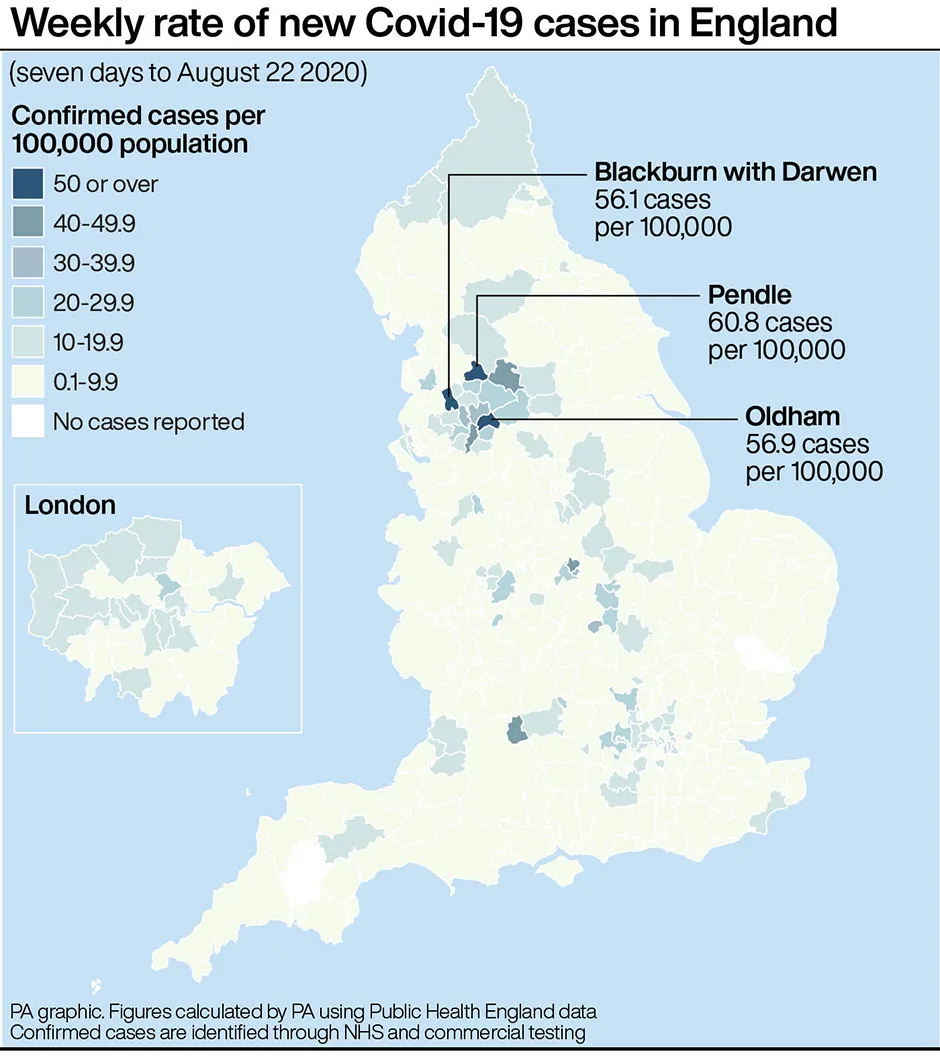A 75-year-old woman in Nottingham was the first person to contract coronavirus in the UK, researchers believe.
The woman, who died after falling ill with the virus, provided a sample on 21 February – which later tested positive – after being admitted to hospital with severe breathing difficulties, researchers from the University of Nottingham say.
They made the discovery after analysing 1,660 samples from 1,378 patients that were collected between 2 January and 11 March from a Nottingham teaching hospital for routine diagnostic investigation.
Writing in a study which has not yet been peer-reviewed, the researchers say: “Patient 1 in this study is, to the best of our knowledge, the earliest described community-acquired case of SARS-CoV-2 in the UK, admitted to hospital care on the 21st of February 2020.”
Read more about COVID-19:
- Scientists think they’ve identified how COVID-19 causes patients to lose their sense of smell
- Coronavirus: Children carry 'significantly more' virus than hospitalised adults
DNA sequencing showed there had been multiple introductions of the virus into the region before wide-scale testing was introduced.
It also reveals the first official case of coronavirus in the area – a traveller who had returned from South Korea and tested positive on 28 February, had most likely caught the virus in Nottingham rather than in Korea, as had been assumed.
Researchers say the overall findings of their study indicate the early spread of COVID-19 could have been prevented if initial case definitions had been less stringent and extensive community testing had been in place sooner.
The results suggest the virus was already circulating widely in local communities in the UK in early February and into March, and was undetected because of restrictive case definitions that informed testing policy at the time, they add.

Initially, COVID-19 testing in the UK required a strict criteria to be met, specifically a recent travel history to China’s Hubei province or contact with a known case and one or more of fever, shortness of breath or a new and persistent dry cough.
This criteria was revised on several occasions to include travel to mainland China and several other Asian countries, then expanded further to include Iran and northern Italy, before finally being removed as essential criteria for diagnostic testing by mid-March.
The researchers’ intensive sequencing of virus strains circulating through March – when there was limited community testing – showed numerous introductions of different strains of the virus that went undetected.
Professor Jonathan Ball, one of the authors of the study, said: “Our data highlights the importance of timely and extensive community testing to prevent future widespread transmission of the virus.
Read the latest coronavirus news:
- Coronavirus: Latest figures suggest R number is above 1.0
- Coronavirus not “going to be a disease like smallpox which could be eradicated by vaccination”
He said: “Had the diagnostic criteria for COVID-19 been widened earlier to include patients with compatible symptoms but no travel history, it is likely that earlier imported infections would have been detected, which could have led to an earlier lockdown and lower deaths.
“However, the capacity for testing available nationally was not sufficient at the time to process the volume of testing required with a broader case definition.
“In order to prepare for any future pandemic such as this, the UK urgently needs to invest in and expand diagnostic capacity within NHS and PHE (Public Health England) diagnostic laboratory services.
“Any lasting investment in the human resources and associated infrastructure to achieve a more agile epidemic response both nationally and globally will undoubtedly save lives and drastically reduce the adverse impact of such outbreaks on the economy.”
How can I protect myself from the coronavirus when shopping?
You’ll have seen signs in your local supermarket advising you to keep two metres from others while moving around the store. This is key to reducing your chances of catching the virus while shopping.
The coronavirus SARS-CoV-2 is spread through respiratory droplets that leave our mouth and nose when we cough, sneeze, or sometimes even talk. The droplets sprayed out by an infected person will contain the virus, which could then enter your body via your mouth, nose or eyes (this is why you shouldn’t be touching your face).
Respiratory droplets don’t usually travel more than one metre, so by keeping two metres from others, you’ll reduce the likelihood of being in the firing line. To make it easier to keep your distance, try to shop during off-peak hours, choose a store that’s limiting the number of people who can be inside at any one time, and use self-checkout if you can.
Keeping your hands clean is the other main thing you can do. If possible, wipe the trolley or basket handles with a disinfectant wipe when you arrive at the store. When you get home, wash your hands or use hand sanitiser before and after unpacking your bags.
A US study found that the coronavirus can survive for up to 24 hours on cardboard, and up to three days on hard, shiny surfaces such as plastic, so wiping down your purchases with a disinfectant spray or a soapy cloth before you put them away is another good habit to get into.
Read more: